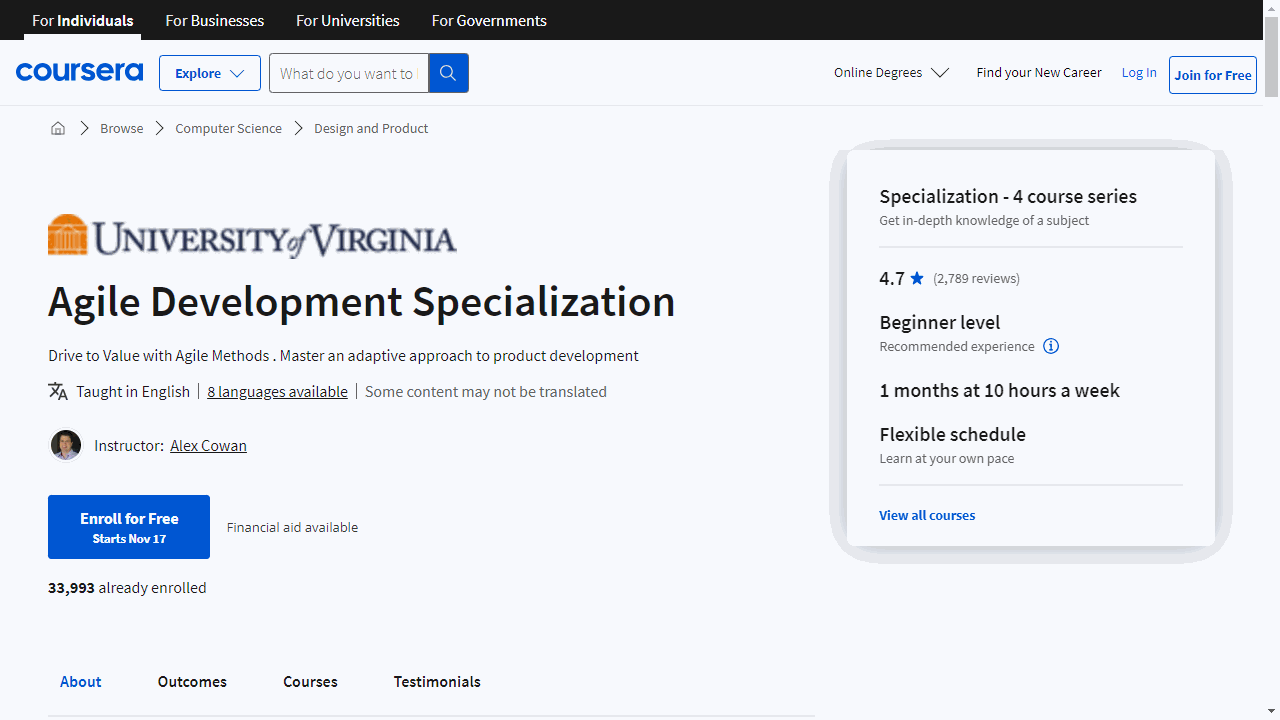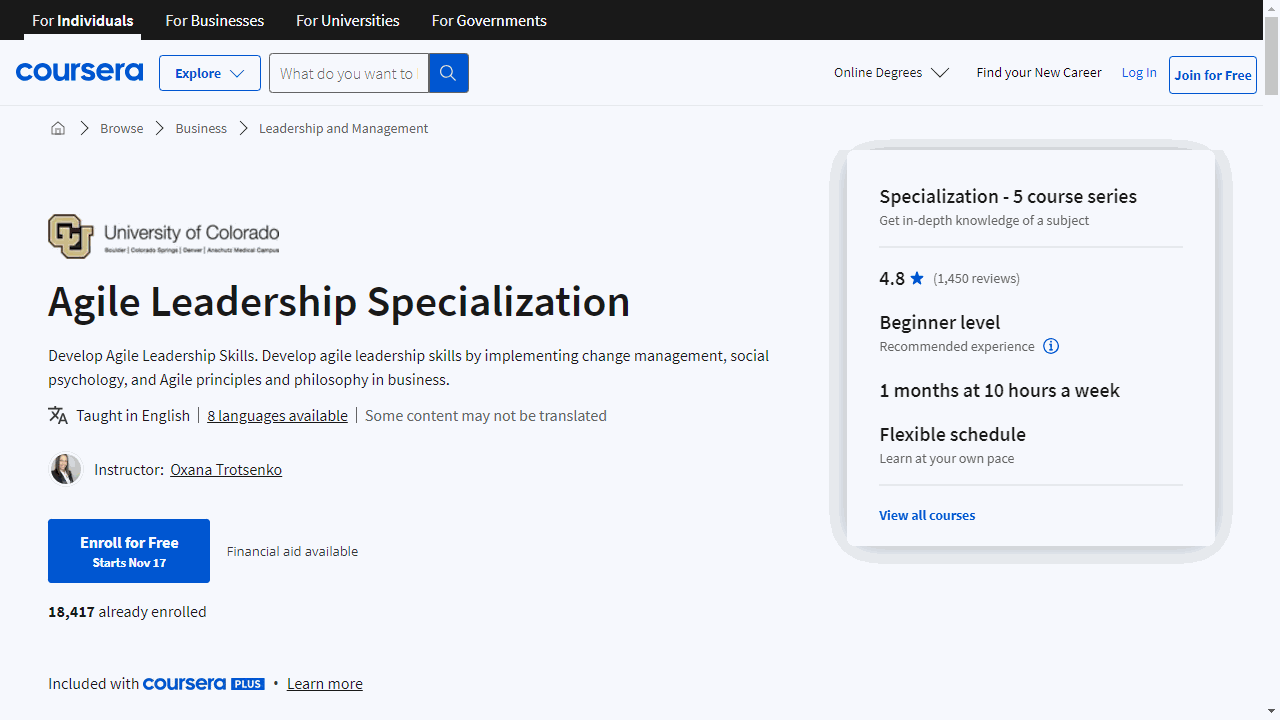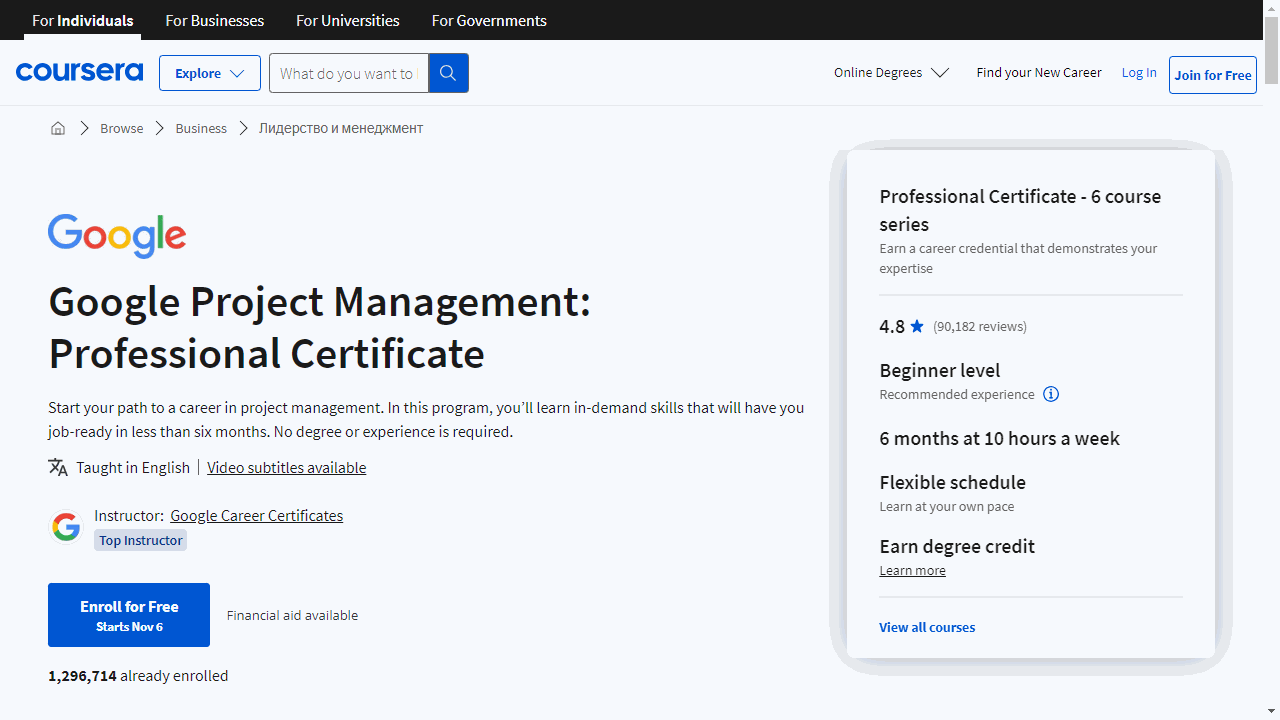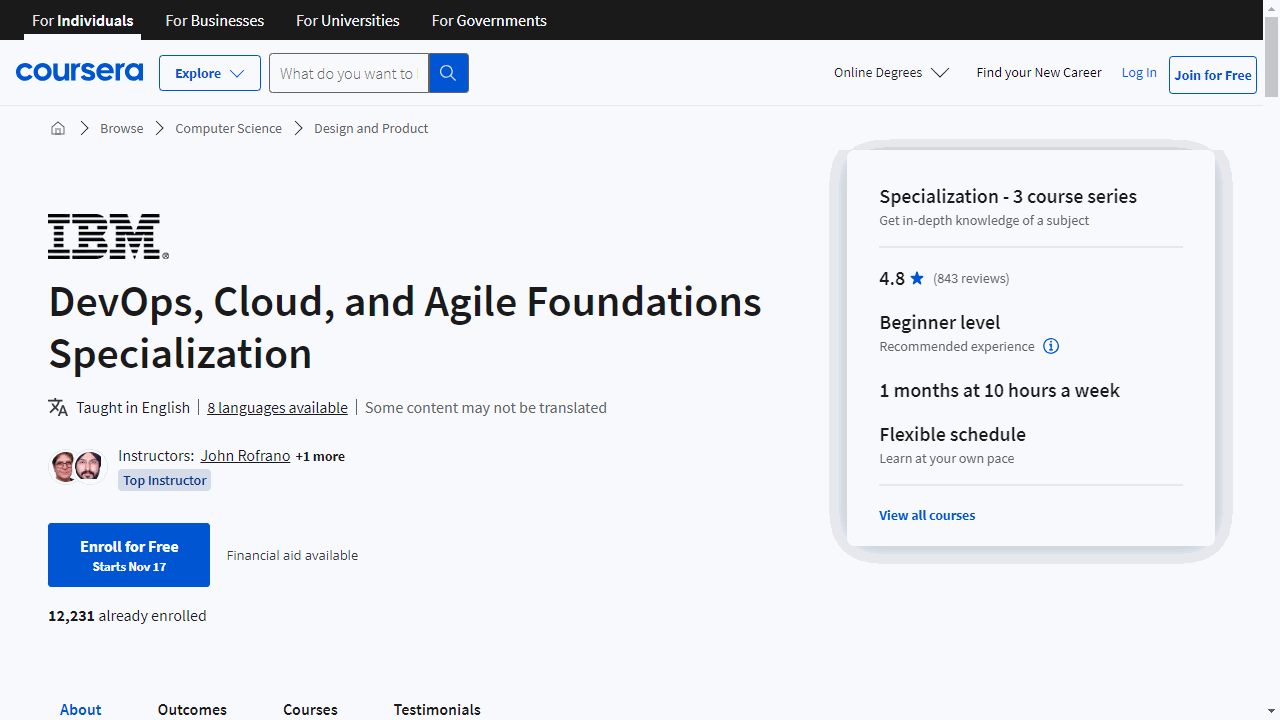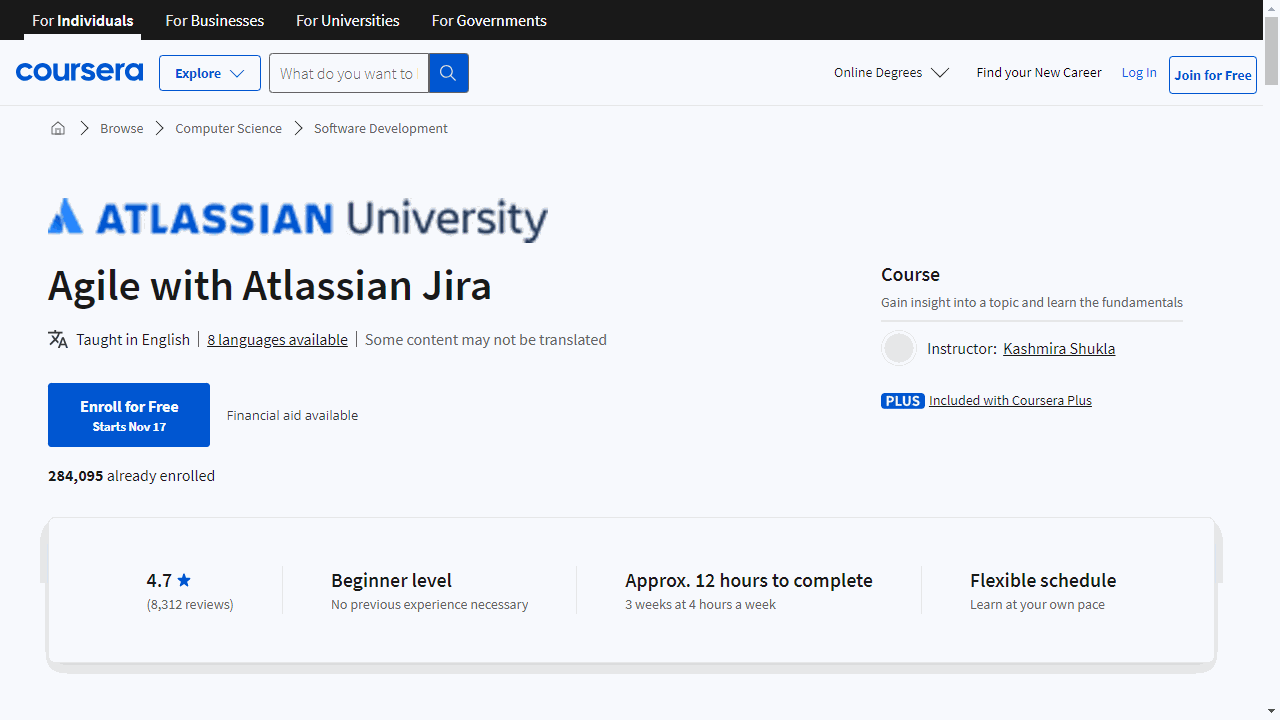Agile methodologies have revolutionized software development by emphasizing iterative development, collaboration, and continuous improvement.
Learning Agile can transform your approach to project management, empowering you to deliver high-quality products faster and more effectively.
By mastering Agile principles, you can become a more adaptable and efficient team member or leader, navigating complex projects with greater agility.
Finding the right Agile course on Coursera can be tricky, with so many options available.
You’re searching for a program that is comprehensive, engaging, and taught by experts.
It should be designed to help you gain practical skills and understand the nuances of Agile practices.
For the best Agile course overall on Coursera, we recommend the Agile Development Specialization offered by the University of Virginia.
This specialization goes beyond the basics, equipping you with a robust set of skills in user experience design, product management, and agile software development.
It will help you guide your team through an agile transformation that’s both effective and sustainable.
This is just one of many excellent options for learning Agile on Coursera.
Keep reading for a detailed look at more options, including specializations focused on leadership, and tailored courses dedicated to specific Agile frameworks like Scrum and Kanban.
Agile Development Specialization
The specialization starts with the course “Agile Meets Design Thinking” addresses a common pitfall in product development: creating something that misses the mark with users.
It equips you with strategies to identify user value early on, using design thinking principles to craft user stories that are both meaningful and testable.
The focus is on building a shared understanding within your team to ensure that you’re working towards solutions that users will embrace.
Moving on to “Hypothesis-Driven Development,” this course emphasizes the importance of a culture of experimentation.
It’s not just about implementing agile processes; it’s about continuously testing and refining your ideas based on user feedback.
You’ll learn to prioritize your efforts, ensuring that every feature you develop is informed by real user needs, thereby minimizing waste and maximizing impact.
“Agile Analytics” takes you through the process of integrating strong analytics into your agile practice.
The course demystifies analytics, making it accessible and actionable.
You’ll discover how to connect your team’s work to the metrics that matter, enabling you to make data-driven decisions that enhance user value with each iteration.
Lastly, “Managing an Agile Team” goes beyond the mechanics of agile to focus on leadership and team dynamics.
It’s about helping your team align their work with the broader company strategy while maintaining the flexibility to innovate.
You’ll gain insights into selecting agile practices that suit your team’s context and learn how to facilitate continuous improvement through effective retrospectives.
Each course is supported by the Batten Institute at UVA’s Darden School of Business, ensuring that the content is grounded in the latest thinking in entrepreneurship and innovation.
By the end of the specialization, you’ll have a robust set of skills in user experience design, product management, and agile software development, as well as the ability to guide your team through an agile transformation that’s both effective and sustainable.
Agile Leadership Specialization
This series of courses is designed to equip you with the skills needed to excel in agile leadership, from the ground up.
The journey begins with “Agile Leadership: Introduction to Change.”
This foundational course is all about understanding the core concepts of agile leadership.
You’ll gain the ability to assess your own leadership style and determine how ready your team and organization are for embracing change.
It’s a practical first step in becoming an agile leader.
Next, “Agile Leader Training” delves into the psychology behind change resistance.
By exploring the neuroscience of change, you’ll learn to manage stress and build resilience.
This course is about personal growth, equipping you with the mindset and tools to stay steady in the face of change.
Moving on to “Developing an Agile Team,” you’ll apply your newfound knowledge to foster a team environment that’s adaptable and resilient.
This course goes beyond individual psychology, introducing social psychology principles and practical applications of the Scrum framework.
It’s about enhancing your ability to lead a team effectively in an agile context.
In “Agile Organization,” the focus shifts to implementing agile at a broader, organizational level.
You’ll explore various change management theories and learn to scale agile practices appropriately.
This course emphasizes the importance of customizing agile principles to fit your organization’s unique needs and culture.
The “Agile Leadership Capstone” is where you’ll put your skills to the test.
You’ll create a comprehensive agile transformation plan, drawing on everything you’ve learned.
This hands-on project simulates real-world challenges and allows you to strategize for personal, team, and organizational development.
Overall, the “Agile Leadership Specialization” offers a well-rounded education in agile principles and leadership.
It’s a thoughtful, practical program that provides the tools and insights necessary for leading agile transformations effectively.
Google Project Management: Professional Certificate
Google’s Project Management Professional Certificate offers a complete education in modern project management.
Throughout the six courses, you’ll gain both hard and soft skills needed to lead projects and teams in any industry.
The program starts with “Foundations of Project Management”. Here you’ll get oriented with PM terminology, roles, and responsibilities. You’ll also preview potential career paths to motivate your learning.
Next is “Project Initiation”, where you’ll master starting projects right by defining goals, scope, stakeholders, and charters. Practical templates help you set expectations and assign responsibilities.
“Project Planning” dives into building plans and budgets. You’ll learn to estimate timelines, procure resources, assess risks, and draft communications plans. Industry tips and tools simplify complex planning.
In “Project Execution”, you’ll discover techniques to track work, manage changes, ensure quality, improve processes, analyze data, and lead teams through the realities of running a project.
“Agile Project Management” explores faster, flexible approaches like Scrum. You’ll learn key events, backlogs, roles, and coaching strategies to adapt PM frameworks.
Finally, an immersive Capstone enables you to apply your new expertise through real-world exercises. You’ll build a portfolio to showcase career readiness.
Throughout the certificate, Google PMs share insider perspectives. The skills are practical and actionable, rooted in data, tools, and workflows used every day by Google teams.
Upon completion, you’ll earn a certificate from a world-leading tech company.
IBM DevOps, Cloud, and Agile Foundations Specialization
The specialization kicks off with “Introduction to DevOps,” a course that lays the groundwork for understanding the DevOps culture.
It’s not just about the technical skills—though you’ll get plenty of those—it’s also about fostering collaboration and shared responsibility.
You’ll explore how to use cloud native architecture to enhance product resilience and delve into essential DevOps tools and practices, such as CI/CD, which streamline the development process.
Moving on to “Introduction to Cloud Computing,” this course demystifies the cloud, providing a clear explanation of its service models and deployment strategies.
You’ll gain insight into the offerings of major cloud providers and learn about the architecture that underpins cloud services.
The course culminates in a hands-on project where you’ll apply what you’ve learned by deploying an application using serverless architecture, giving you a tangible skill to showcase.
Lastly, “Introduction to Agile Development and Scrum” introduces you to the world of Agile methodologies, focusing on how to adapt to change and deliver value quickly.
You’ll understand the roles within a Scrum team and the importance of iterative planning.
By learning to write effective user stories and manage a product backlog, you’ll be equipped to enhance team efficiency and meet customer needs more effectively.
The content is presented in a straightforward manner, with a focus on real-world application, ensuring that you’re not just learning theories but also how to apply them in practice.
Agile with Atlassian Jira
This course offers a thorough introduction to Agile methodologies, coupled with practical experience using Jira, a leading project management tool.
The course begins with an Agile Overview, providing a foundational understanding of Agile principles and practices.
This sets the stage for the rest of the curriculum, ensuring you grasp the core concepts that drive Agile project management.
Next, the Jira Overview introduces you to the functionalities of this powerful tool.
You’ll learn how to navigate Jira’s interface, which is essential for managing and tracking your Agile projects effectively.
Understanding how to visualize work is crucial, and the course covers this through the Boards section.
You’ll learn how to organize and prioritize tasks, giving you clarity on your project’s progress at a glance.
Kanban is explored in depth with two separate overviews.
These sessions will equip you with strategies to optimize your workflow, helping you to improve efficiency and delivery times.
The course is rich with hands-on labs, allowing you to apply what you’ve learned in a practical setting.
You’ll set up both Company-managed and Team-managed projects, configuring Kanban boards and practicing with real Jira tools.
Scrum is also a significant focus, with detailed overviews of its Artifacts, Roles, and Events.
This will help you understand how Scrum can facilitate rapid and iterative product development.
You’ll also touch on the historical roots of Agile with a look at Toyota Kanban and Lean Principles, providing context for the methodologies you’re using.
The course ensures you become proficient in Jira’s search and issue management features.
Lessons on Quick Search, Basic Search, JQL, and Filters will make navigating and organizing issues straightforward.
Configuring Issues and understanding Issue Types are demystified through targeted labs, where you can practice in a controlled environment.
For those interested in project planning and tracking, the sections on Epics and Versions are invaluable.
They teach you how to manage large-scale work and track progress over time.
The course also covers Users and Groups management, a key aspect of project management that involves organizing your team within Jira.
For those who choose to delve deeper, there’s an optional section on Permissions, enhancing your understanding of Jira’s security settings.
Finally, the Final Project consolidates all the skills you’ve acquired.
It’s a practical application of the course content, giving you the opportunity to implement a full Agile project using Jira.
This course is a well-rounded educational experience that combines Agile theory with the technical know-how of Jira.
It’s designed to provide you with actionable skills that can be immediately applied to your work.
